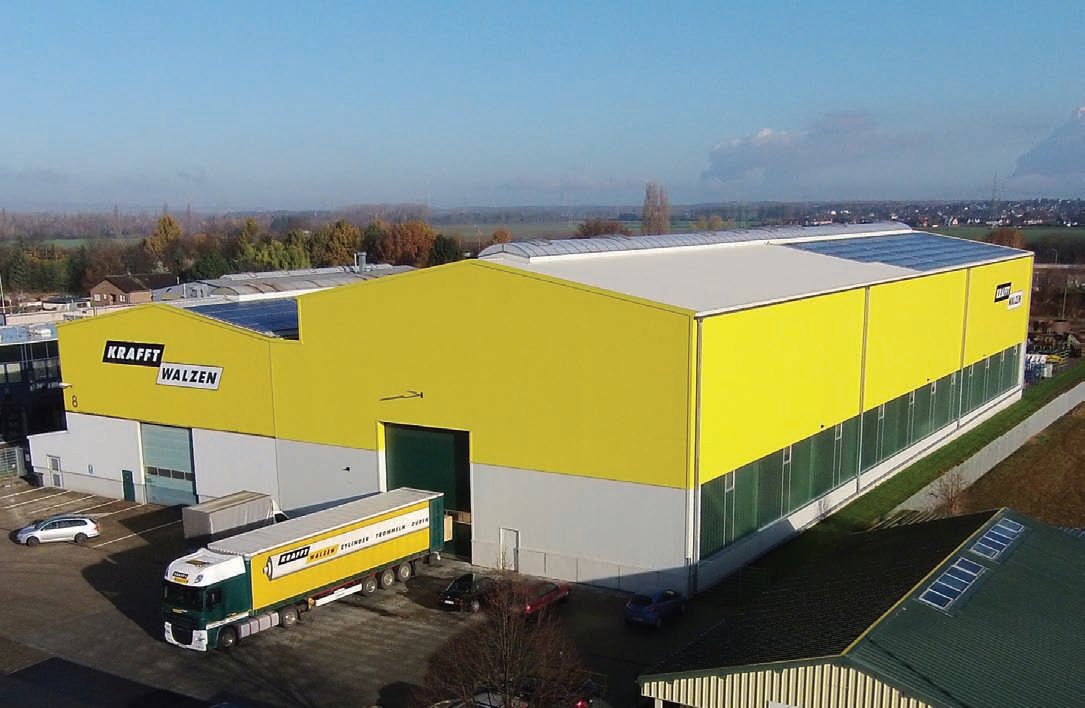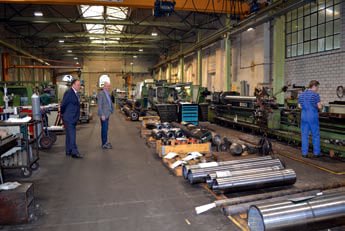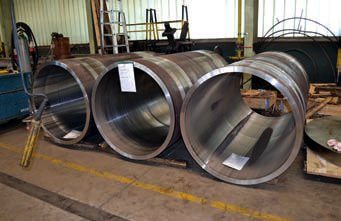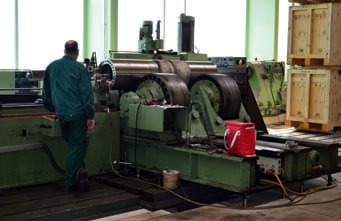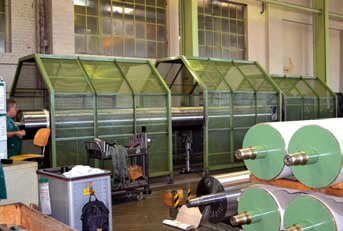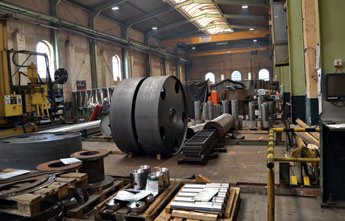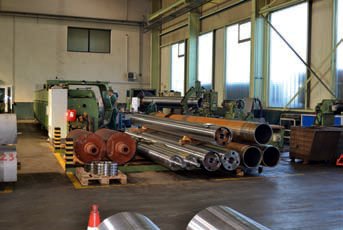At the heart of the press
5 January 2016Kelzenberg in Düren specialises in the manufacture of the drums and rolls which are at the heart of every type of continuous press, from calender to today’s sophisticated continuous presses, all based on a long history of specialist engineering skills and a long-standing connection with the paper industry.
Family-owned since 1870, Carl Krafft & Söhne GmbH & Co KG has always been associated with specialist engineering for the pulp and paper industry.
Its home town of Düren has been a paper making centre since the nineteenth century, due to the clean water available from the river Rur that runs through the town. Krafft, like several other engineering companies, grew up around the paper industry.
The knowledge obtained from that long association led, in the 1980s, to the company specialising in the design and production of rollers, drums and cylinders.
That in turn led to Krafft entering the panel industry, supplying drums for the continuous presses supplied by Metso and Siempelkamp.
Although not an oem (original equipment manufacturer) these days, the company supplies replacement drums for all those presses.
In late 1999, Krafft took over the Kelzenberg company, which also specialised in making drums, and the drums for the panel industry have since then been supplied under the Kelzenberg name.
Michael Hess is from the founding family of Krafft, which still owns the company today, and his sister Alice Speth is also on the board of Krafft. Mr Hess is the general manager of Kelzenberg.
In 2014, Peter Kayser became a partner in the parent Krafft company; and its managing director.
The drums which Kelzenberg makes for today's continuous presses are not cast, but are fabricated from steel plate, bent to shape and welded together into cylinders.
However, the large drums for Mende- -type presses are assembled with welds and bolts because they require access and dismantling for maintenance. There are three such drums in the world that have a large diameter of five metres, made by Kelzenberg. Such large drums also require dismantling for transportation.
In 2014, Krafft extended its workshop and brought the Kelzenberg operation inhouse from its original premises, also in Düren, thus combining the drum-making expertise of Krafft and Kelzenberg under one roof.
Today, the Düren site has 110 employees and takes on 15 apprentices a year. It has a turnover of around €18m, with Krafft active in the textile, automotive, cranes, windenergy, film and foil production and food and chemical industries, as well as in the wood based panel sector.
"We are not just a manufacturer," said Mr Hess. "The vast majority of our production is to our own design. We analyse customer requirements, design a solution, carry out engineering simulations, manufacture, assemble and install and offer on-site servicing of our equipment. And we don't just supply the rollers or drums, but also the bearings, pulleys and so on - anything that is required."
"We can produce drums up to 5.5 metres in diameter or 15 metres in length and up to a maximum weight of 100 tonnes," said Mr Hess.
The drums in any continuous press have to apply pressure and keep the stainless steel belts in tension. Those in calender presses additionally require heating of the drums. The wall thickness of these drums is 100-150mm and Kelzenberg drills channels into the walls, connected to each other at the ends, and hot thermal oil flows through these channels.
"In the drums of 20 or 30 years ago, the walls were thinner and had 'halfpipes' welded to the inner surface of the wall," explained Mr Hess. "This meant a lot of welding and therefore the scope for failure of those joints. The welds could also provide the starting point for cracks in the wall of the drum, necessitating total replacement. That is why we drill the thermal oil channels within the walls of the drum."
Mr Kayser pointed out a particular difficulty for the panel industry in replacing the drums: panel manufacturers do not normally have gantry cranes in the production hall, thus often necessitating removal of the roof and lifting the drum out with a mobile crane.
"The larger [particleboard, MDF or OSB] manufacturers will keep a spare drum in stock because they know that they can fail and that the lead time for a new one could be two months or even more," said Mr Kayser.
"In Mende-type [calender] presses, the centrally heated drum requires special components and a great deal of workshop time, so the lead time can be up to 10 or 12 months, therefore we hold stock of the major components on behalf of a customer, in order to reduce that lead time."
To illustrate the competence of the company, Mr Hess said that in the tissue paper industry, the paper needs to go from pulp to dry tissue in 1.2 seconds, requiring lines that can run at up to 2,200m/minute.
"Rolls have to be finely balanced at that sort of speed and Krafft has been a pioneer in precision balancing for over 30 years," said the general manager.
Obviously, panel lines are not required to run at anywhere near those speeds, but the drums still have to be finely machined to achieve the required tolerances.
Project engineering
"Some customers know exactly what they want, while others have no idea," said Mr Kayser. "We can help to meet their demands with a full design service, taking into account the fact that a panel mill is a harsh environment. Each industry has its own specific demands and we have the experience to cater to them."
When it comes to delivering a project, Kelzenberg has its own trucks, or can arrange shipment outside Europe as an integrated part of its customer service.
"We have enormous production and technological know-how. We are not a competitor to the large oem suppliers [who supply the continuous presses], but we are a back-up to them as experts in drums and rolls - we are a synergistic partner to the end-user and/or the oem.
"Our archives go back many years in all the industries that we serve, and we have state-of-the-art design which we continually develop. This is backed up with drawings," said Mr Kayser.
The factory
In the workshop at the main site in Düren, the company can produce rolls up to 12m in length and balance them. For the paper, pulp, foil and film industries, all the rolls are made from steel tube, with a fully welded or bolted end to the roll.
Alternatively, and in the system preferred by Kelzenberg, the company can shrink the ends into the rolls, reducing the temperature of the end of the shaft to -160oC and then expanding it into place. "Heat and welding destroy the geometry of the roll, but cold doesn't," explained Mr Hess.
The workshops contain some sophisticated engineering equipment, including a machine which combines the function of a lathe with a milling machine, so it can turn the roll, drill holes in its ends and thread those holes, all in the one machine.
Another machine drills the length of drums for the heating channels.
In a second workshop, one kilometre from the first and built in 2014 to accommodate the move of Kelzenberg to the Krafft site, the company produces the larger diameter rolls and drums, up to 15m in length.
The total undercover production area for Krafft amounts to 12,500m2, as well as 900m2 for administration and the engineering department.
The Krafft group has a very long history specialising in the production of rolls and drums of all dimensions for many industries, to a high level of accuracy.
In the panel industry, it has long held an important role as an experienced supplier of the drums that are at the heart of the continuous presses used throughout the world in the production of MDF, particleboard and OSB.
